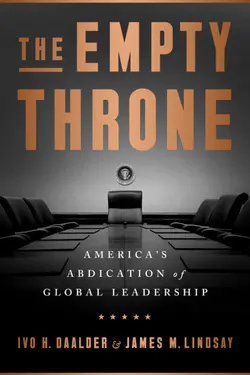
The Empty Throne
America's Abdication of Global Leadership

American diplomacy is in shambles under Trump, but beneath the daily chaos is an erosion of the postwar order that is even more dangerous.
- Book
- Foreign policy analyses written by CFR fellows and published by the trade presses, academic presses, or the Council on Foreign Relations Press.
America under President Donald J. Trump is abdicating its important leadership role in the current world order, write Ivo H. Daalder and James M. Lindsay in their new book, The Empty Throne: America’s Abdication of Global Leadership. “Trump’s first year and a half in office sent an unmistakable message. He had no interest in leading America’s friends and allies. He was looking to beat them,” they write.
The three pillars of the postwar foreign policy that America created—strong alliances, open markets, and commitment to democracy and human rights—are under threat from a president who sees little value in them, according to the authors. “[Trump] didn’t see global leadership as the solution to what ailed America. To the contrary. He saw it as the problem,” they note.
Daalder, who served as U.S. ambassador to the North Atlantic Treaty Organization (NATO) under President Barack Obama, is president of the Chicago Council on Global Affairs. Lindsay is senior vice president, director of studies, and Maurice R. Greenberg Chair at the Council on Foreign Relations. They previously coauthored America Unbound: The Bush Revolution in Foreign Policy, which won the 2003 Lionel Gelber Prize.
More on:
The rules-based order that emerged after World War II “was neither inevitable nor necessarily permanent. It resulted from conscious American leadership,” write Daalder and Lindsay. The authors assert that in relinquishing this leadership role, “Donald Trump wagered that the United States could secure the benefits of the world it created without bearing the burdens of leading it. That bet is unlikely to pay off.”
Daalder and Lindsay argue that the Trump administration’s foreign policy decisions make the president’s “America First” axiom look increasingly like America alone. Citing the U.S. withdrawal from the Trans-Pacific Partnership, the Paris climate accords, and the Iran nuclear deal; the imposition of tariffs on allies and rivals alike; and Trump’s frequent praise for authoritarian leaders; they observe that “Trump was proposing to shed what he saw as the delusion of global leadership. He wanted a foreign policy that would be more self-promoting, more nationalist, and utterly transactional.”
Meanwhile, “A majority of Americans has consistently favored American engagement abroad,” the authors note. In fact, they argue that public support on issues such as defense of allies and the domestic economic benefits of trade actually increased after Trump took office. The authors maintain that “The potential still exists to reinvigorate American global leadership. Trump unintentionally has set the grounds for such a renewal. . . . his refusal to lead showed allies how much they had invested in the international order—and how essential American leadership was to maintaining it.”
Daalder and Lindsay caution that allies will look elsewhere for leadership in America’s absence, while rivals will fill the void left in its wake. In a complementary essay in the November/December issue of Foreign Affairs, Daalder and Lindsay call for a “G9” of like-minded nations to maintain the rules-based order. “The major allies of the United States can leverage their collective economic and military might to save the liberal world order. France, Germany, Italy, the United Kingdom, and the [European Union] in Europe; Australia, Japan, and South Korea in Asia; and Canada in North America are the obvious candidates to supply the leadership that the Trump administration will not,” they write.
“The price for winning rather than leading will be large—a world in greater disarray and an America that is less prosperous, less secure, and perhaps even less free,” they conclude.
More on:
 Online Store
Online Store